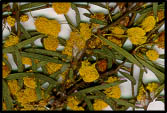South West Slopes Revegetation Guide
Acacia verniciflua
Varnish Wattle
Select from the following for detailed images.
Species Information
| Synonyms |
|
| Common Names |
Varnish Wattle |
| Family |
Mimosaceae - Mimosa family. |
| Name Origin |
Varnish - refers to the shiny or sticky 'leaf' appearance. |
Specimen Data - CSU 575
| Location |
Main Road between Culcairn and Walbundrie. NSW |
| Notes |
Zone: 55 Easting: 495426 Northing: 6052923Found on roadside. |
| Collector |
Kent, Kylie |
Date |
20/09/1999 |
| Determined By |
Lunt, Ian |
Date |
02/11/1999 |
South West Slopes Revegetation Guide Information
| Regional: |
Widespread throughout region on lower slopes and rises. Less common in the western, drier areas. |
| Australia: |
Qld, NSW, Vic, Tas, SA. |
| Habitat: |
Chiefly dry sclerophyll forest. Often along rocky streams or skeletal ridges. Also in Box woodland. |
| Habit: |
Erect or spreading tree or shrub 1-5 m high. Finely fissured grey bark, angled or flattened, usually resinous branchlets, and resinous 'leaves' 3-14 cm long. |
| Similar Species: |
|
| Site Preference: |
|
| Characteristics: |
Not known to be grazed by livestock. |
| Flowering: |
Golden-yellow, Aug-Oct. |
| Seed Collection: |
Mid Nov to early Jan, when pods brown and sticky. |
| Propagation: |
From scarified seed ( 63 viable seeds per gram). Pour boiling over seeds and soak for several hours before drying and sowing. |
| Regeneration: |
From scarified seed ( 63 viable seeds per gram). Pour boiling over seeds and soak for several hours before drying and sowing. |
| Timber: |
|
| Shade and Shelter: |
Useful low-level cover for windbreaks. |
| Land Protection: |
Useful for controlling soil erosion due to soil-binding fibrous roots. Legume - improves soil fertility by 'fixing' nitrogen. |
| Wildlife: |
Excellent habitat. Flowers are a pollen source for native moths, butterflies and other insects. Insect-eating birds such as the Regent Honeyeater attracted. Seed source for parrots and native pigeons. Grubs living in bark are food for native birds. |
| Ornamental: |
Attractive, with glistening resinous foliage and bright yellow flowers. |
| Other: |
Reputedly used to stupefy fish before capture. |
Note: The following information presented is only a guide, as plant characteristics vary depending on provenance (the plant's locality).
| Site/Preferred Habitat : |
well-drained shallow soils |
| Rainfall(mm) : |
400+ |
| Growth Rate : |
fast |
| Tolerates : |
frost; dryness |
| Resents : |
|
| Uses & Comments : |
windbreak; stabilising soil; fixes nitrogen; wildlife; ornamental |
Return to Database List
